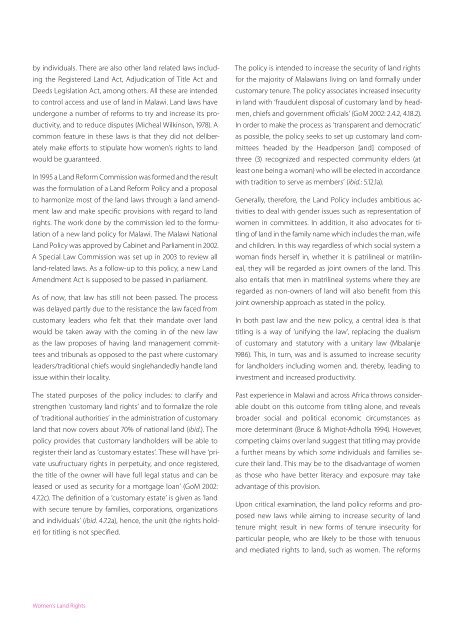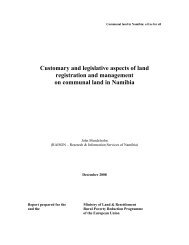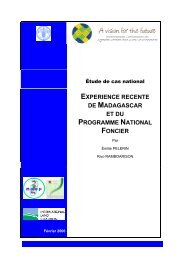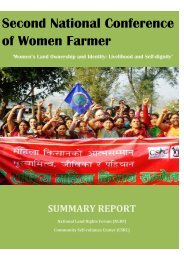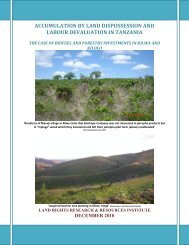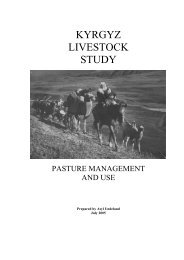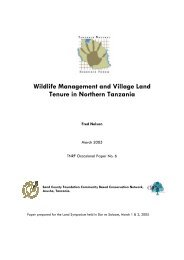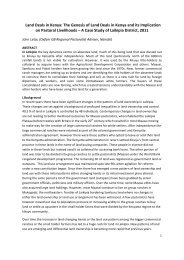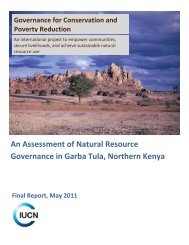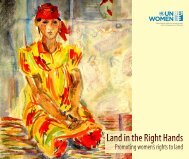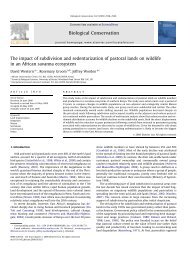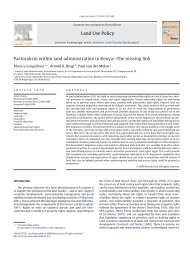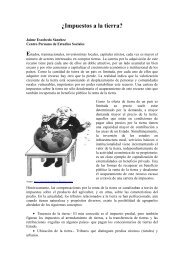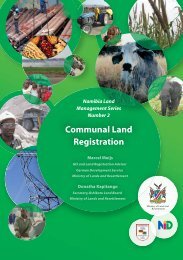Women's access to land and household bargaining power
Women's access to land and household bargaining power
Women's access to land and household bargaining power
Create successful ePaper yourself
Turn your PDF publications into a flip-book with our unique Google optimized e-Paper software.
y individuals. There are also other <strong>l<strong>and</strong></strong> related laws includ-<br />
ing the Registered L<strong>and</strong> Act, Adjudication of Title Act <strong>and</strong><br />
Deeds Legislation Act, among others. All these are intended<br />
<strong>to</strong> control <strong>access</strong> <strong>and</strong> use of <strong>l<strong>and</strong></strong> in Malawi. L<strong>and</strong> laws have<br />
undergone a number of reforms <strong>to</strong> try <strong>and</strong> increase its pro-<br />
ductivity, <strong>and</strong> <strong>to</strong> reduce disputes (Micheal Wilkinson, 1978). A<br />
common feature in these laws is that they did not deliber-<br />
ately make efforts <strong>to</strong> stipulate how women’s rights <strong>to</strong> <strong>l<strong>and</strong></strong><br />
would be guaranteed.<br />
In 1995 a L<strong>and</strong> Reform Commission was formed <strong>and</strong> the result<br />
was the formulation of a L<strong>and</strong> Reform Policy <strong>and</strong> a proposal<br />
<strong>to</strong> harmonize most of the <strong>l<strong>and</strong></strong> laws through a <strong>l<strong>and</strong></strong> amend-<br />
ment law <strong>and</strong> make specific provisions with regard <strong>to</strong> <strong>l<strong>and</strong></strong><br />
rights. The work done by the commission led <strong>to</strong> the formu-<br />
lation of a new <strong>l<strong>and</strong></strong> policy for Malawi. The Malawi National<br />
L<strong>and</strong> Policy was approved by Cabinet <strong>and</strong> Parliament in 2002.<br />
A Special Law Commission was set up in 2003 <strong>to</strong> review all<br />
<strong>l<strong>and</strong></strong>-related laws. As a follow-up <strong>to</strong> this policy, a new L<strong>and</strong><br />
Amendment Act is supposed <strong>to</strong> be passed in parliament.<br />
As of now, that law has still not been passed. The process<br />
was delayed partly due <strong>to</strong> the resistance the law faced from<br />
cus<strong>to</strong>mary leaders who felt that their m<strong>and</strong>ate over <strong>l<strong>and</strong></strong><br />
would be taken away with the coming in of the new law<br />
as the law proposes of having <strong>l<strong>and</strong></strong> management committees<br />
<strong>and</strong> tribunals as opposed <strong>to</strong> the past where cus<strong>to</strong>mary<br />
leaders/traditional chiefs would singleh<strong>and</strong>edly h<strong>and</strong>le <strong>l<strong>and</strong></strong><br />
issue within their locality.<br />
The stated purposes of the policy includes: <strong>to</strong> clarify <strong>and</strong><br />
strengthen ‘cus<strong>to</strong>mary <strong>l<strong>and</strong></strong> rights’ <strong>and</strong> <strong>to</strong> formalize the role<br />
of ‘traditional authorities’ in the administration of cus<strong>to</strong>mary<br />
<strong>l<strong>and</strong></strong> that now covers about 70% of national <strong>l<strong>and</strong></strong> (ibid.). The<br />
policy provides that cus<strong>to</strong>mary <strong>l<strong>and</strong></strong>holders will be able <strong>to</strong><br />
register their <strong>l<strong>and</strong></strong> as ‘cus<strong>to</strong>mary estates’. These will have ‘private<br />
usufructuary rights in perpetuity, <strong>and</strong> once registered,<br />
the title of the owner will have full legal status <strong>and</strong> can be<br />
leased or used as security for a mortgage loan’ (GoM 2002:<br />
4.7.2c). The definition of a ‘cus<strong>to</strong>mary estate’ is given as ‘<strong>l<strong>and</strong></strong><br />
with secure tenure by families, corporations, organizations<br />
<strong>and</strong> individuals’ (ibid. 4.7.2a), hence, the unit (the rights holder)<br />
for titling is not specified.<br />
Women’s L<strong>and</strong> Rights<br />
The policy is intended <strong>to</strong> increase the security of <strong>l<strong>and</strong></strong> rights<br />
for the majority of Malawians living on <strong>l<strong>and</strong></strong> formally under<br />
cus<strong>to</strong>mary tenure. The policy associates increased insecurity<br />
in <strong>l<strong>and</strong></strong> with ‘fraudulent disposal of cus<strong>to</strong>mary <strong>l<strong>and</strong></strong> by headmen,<br />
chiefs <strong>and</strong> government officials’ (GoM 2002: 2.4.2, 4.18.2).<br />
In order <strong>to</strong> make the process as ‘transparent <strong>and</strong> democratic’<br />
as possible, the policy seeks <strong>to</strong> set up cus<strong>to</strong>mary <strong>l<strong>and</strong></strong> committees<br />
‘headed by the Headperson [<strong>and</strong>] composed of<br />
three (3) recognized <strong>and</strong> respected community elders (at<br />
least one being a woman) who will be elected in accordance<br />
with tradition <strong>to</strong> serve as members’ (ibid.: 5.12.1a).<br />
Generally, therefore, the L<strong>and</strong> Policy includes ambitious activities<br />
<strong>to</strong> deal with gender issues such as representation of<br />
women in committees. In addition, it also advocates for titling<br />
of <strong>l<strong>and</strong></strong> in the family name which includes the man, wife<br />
<strong>and</strong> children. In this way regardless of which social system a<br />
woman finds herself in, whether it is patrilineal or matrilineal,<br />
they will be regarded as joint owners of the <strong>l<strong>and</strong></strong>. This<br />
also entails that men in matrilineal systems where they are<br />
regarded as non-owners of <strong>l<strong>and</strong></strong> will also benefit from this<br />
joint ownership approach as stated in the policy.<br />
In both past law <strong>and</strong> the new policy, a central idea is that<br />
titling is a way of ‘unifying the law’, replacing the dualism<br />
of cus<strong>to</strong>mary <strong>and</strong> statu<strong>to</strong>ry with a unitary law (Mbalanje<br />
1986). This, in turn, was <strong>and</strong> is assumed <strong>to</strong> increase security<br />
for <strong>l<strong>and</strong></strong>holders including women <strong>and</strong>, thereby, leading <strong>to</strong><br />
investment <strong>and</strong> increased productivity.<br />
Past experience in Malawi <strong>and</strong> across Africa throws considerable<br />
doubt on this outcome from titling alone, <strong>and</strong> reveals<br />
broader social <strong>and</strong> political economic circumstances as<br />
more determinant (Bruce & Mighot-Adholla 1994). However,<br />
competing claims over <strong>l<strong>and</strong></strong> suggest that titling may provide<br />
a further means by which some individuals <strong>and</strong> families secure<br />
their <strong>l<strong>and</strong></strong>. This may be <strong>to</strong> the disadvantage of women<br />
as those who have better literacy <strong>and</strong> exposure may take<br />
advantage of this provision.<br />
Upon critical examination, the <strong>l<strong>and</strong></strong> policy reforms <strong>and</strong> proposed<br />
new laws while aiming <strong>to</strong> increase security of <strong>l<strong>and</strong></strong><br />
tenure might result in new forms of tenure insecurity for<br />
particular people, who are likely <strong>to</strong> be those with tenuous<br />
<strong>and</strong> mediated rights <strong>to</strong> <strong>l<strong>and</strong></strong>, such as women. The reforms


